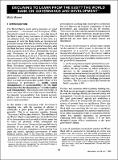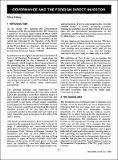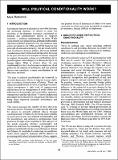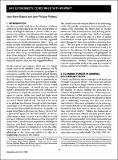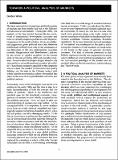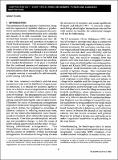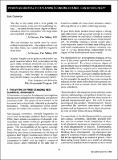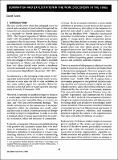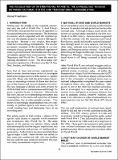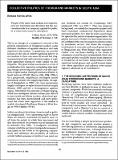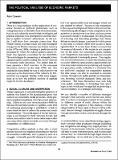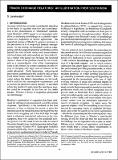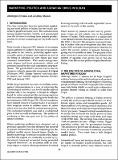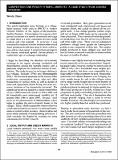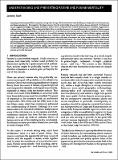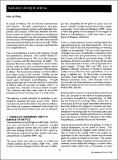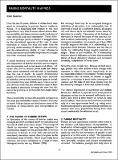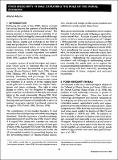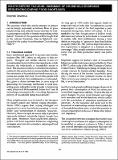Volumes 21 - 30: Getting Institutions Right for Women in Development: Recent submissions
Now showing items 141-160 of 444
-
DECLINING TO LEARN FROM THE EAST? THE WORLD BANK ON ‘GOVERNANCE AND DEVELOPMET’
(Institute of Development Studies, 01/01/1993)Summary The World Bank's policy statement on good government — Governance and Development (1992) — represents the most thoughtful official contribution to the debate from the aid donors. It does not discuss good government ... -
GOVERNANCE AND THE FOREIGN DIRECT INVESTOR
(Institute of Development Studies, 01/01/1993)Summary Mike Faber's article examines what is thought to constitute ‘good governance’ towards direct foreign investment (DFI). Draft guidelines being prepared by the Development Committee of the World Bank and IMF are ... -
WILL POLITICAL CONDITIONALITY WORK?
(Institute of Development Studies, 01/01/1993)Summary The objectives of political conditionality, where aid is made conditional on political and administrative reform, are to promote democracy, improve human rights and to enhance administrative efficiency. This article ... -
ARE ECONOMISTS CONCERNED WITH POWER?
(Institute of Development Studies, 01/07/1993)Summary While till recently economists were essentially concerned with analysing the (free) play of market forces and their consequences, thus leaving power outside their field of investigation, the same cannot be said ... -
TOWARDS A POLITICAL ANALYSIS OF MARKETS
(Institute of Development Studies, 01/07/1993)Summary The author agues that conventional economics ignores or marginalizes the role of power and politics which are crucial factors in conditioning the variable structure and performance of markets. Using a power?based ... -
‘CONTRACTED?OUT’: SOME REFLECTIONS ON GENDER, POWER AND AGRARIAN INSTITUTIONS
(Institute of Development Studies, 01/07/1993)Summary In recent years that has been a revival of interest in the economic analysis of social institutions and market behaviour in developing economies. Whilst customary arrangements surrounding economic exchange were ... -
POWER AS CENTRAL IN EXPLAINING ECONOMIC CHANGE: CAN KEYNES HELP?
(Institute of Development Studies, 01/07/1993)Summary Economics as a subject rests upon assumptions which are not ‘economic’ but invariably, implicitly or explicitly, impute the exercise of power. Neo?classical economics pushes power into an ill?defined decision ... -
DOMINATION AND EXPLOITATION IN THE WORLD ECONOMY IN THE 1990s
(Institute of Development Studies, 01/07/1993)Summary This speculative article explores the economic and ethical aspects of inequality in the new post?cold war world and the relations of domination required to reproduce them in the context of a more general theory ... -
THE REGULATION OF INTERNATIONAL MARKETS: THE UNRESOLVED TENSION BETWEEN NATIONAL STATES AND TRANSNATIONAL ACCUMULATION
(Institute of Development Studies, 01/07/1993)Summary This article depicts the rules and institutions which have attempted to regulate world commerce and investments since World War II. So far the national state has been the political arena for playing out the tension ... -
COLLECTIVE POLITICS OF FOODGRAINS MARKETS IN SOUTH ASIA
(Institute of Development Studies, 01/07/1993)Summary With the help of case material from Tamil Nadu, West Bengal and Bangladesh, the politics of market organization is examined. Political parties do not have consistent positions on private trade and are responded ... -
THE POLITICAL ANALYSIS OF ECUNOMIC MARKETS
(Institute of Development Studies, 01/07/1993)Summary This article presents a framework drawn from Weber for analysing markets as dynamic processes in which competition is seen as a struggle to deny opportunities to others. Markets have a tendency to monopolization ... -
TRIADIC EXCHANGE RELATIONS: AN ILLUSTRATION FROM SOUTH INDIA
(Institute of Development Studies, 01/07/1993)Summary An issue which has attracted considerable attention in the study of agrarian structure is the phenomenon of interlinked markets. Amit Bhaduri has integrated interlinkage into an analytical explanation for stagnation ... -
MARKETING, POLITICS AND AGRARIAN CRISIS IN SUDAN
(Institute of Development Studies, 01/07/1993)Summary In the case of Sudan, the politics of agrarian crisis grew out of, but differs from, the normal politics of agricultural marketing. From the imposition of colonial rule crop marketing structures have transformed ... -
COMPETITION AND POWER IN RURAL MARKETS: A CASE STUDY FROM ANDHRA PRADESH
(Institute of Development Studies, 01/07/1993)Summary In a study of two villages in Andhra Pradesh, done in 1986/87, there were clear linkages between credit transactions and sales of crops. Producers from powerful classes were able to control the timing of sales of ... -
Understanding And Preventing Famine and Famine Mortality
(Institute of Development Studies, 01/10/1993) -
Demographic Responses To Famines In South Asia
(Institute of Development Studies, 01/10/1993)Summary This article examines demographic responses to major famines in the Indian subcontinent, including the Bengal famine of 1943–44, the Bangladesh famine of 1974–75 and food crises in Bihar and Maharashtra. It argues ... -
War and Famine in Africa
(Institute of Development Studies, 01/10/1993)Summary War is the major cause of famine in Africa. Wars cause famine in three major ways: (1) the direct destruction of battle, and the consumption of resources, including food, by armies; (2) famine is a weapon of war, ... -
Famine Mortality in Africa
(Institute of Development Studies, 01/10/1993)Summary The evidence of African famine mortality is briefly reviewed in terms of: (1) the probable biological effects of given conditions of food shortage, displacement, exposure to disease and other risks; (2) the observed ... -
Food Insecurity in Mali: Exploring the Role of the Moral Economy
(Institute of Development Studies, 01/10/1993)Summary This article challenges the view that the ‘moral economy’ has little relevance to the problems of food insecurity and famine in the contemporary context. Fieldwork in central Mali reveals an array of social practices ... -
Goats Before Ploughs: Dilemmas of Household Response Sequencing During Food Shortages
(Institute of Development Studies, 01/10/1993)Summary This article draws on the ‘entitlement’ and ‘coping strategies’ literature to argue that consumption smoothing is not the only priority of poor households facing food production shocks or income declines. In ...

